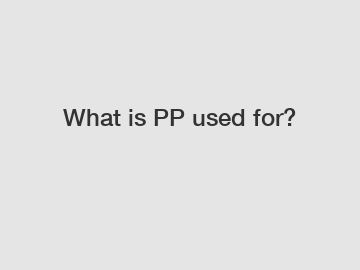Dec. 29, 2023
Rubber & Plastics
What is PP used for?
PP, short for polypropylene, is a versatile material widely used for various applications. It is a type of thermoplastic polymer that is highly resistant to heat, chemicals, and fatigue. PP finds its application in a wide range of industries, such as packaging, automotive, construction, and textiles.
The origins of PP can be traced back to the mid-1950s when the polymerization of propylene gas was first achieved. This breakthrough led to the development of polypropylene, which quickly gained popularity due to its unique properties and affordability. Since then, PP has become one of the most widely used plastics in the world.

The versatility of PP is a result of its chemical structure. The polymerization process creates a long-chain structure with repeating units of propylene monomers. This molecular structure gives PP its key attributes, including high tensile strength, excellent chemical resistance, and thermal stability.
One of the primary uses of PP is in the packaging industry. PP is commonly used to produce thin, flexible films for food packaging, such as bags, wrapping material, and lamination films. Its excellent moisture resistance and low permeability to gases make it an ideal choice for keeping food fresh and extending its shelf life. Additionally, PP's ability to withstand high temperatures makes it suitable for microwave-safe containers and packaging for hot beverages.
Further reading:In the automotive industry, PP is widely used for manufacturing interior and exterior components. Its lightweight nature, combined with its strength, allows for the production of durable yet fuel-efficient vehicles. PP can be found in bumpers, dashboards, door panels, and even battery casings. Its resistance to chemicals and UV radiation makes it ideal for outdoor applications, ensuring longevity and color stability.
Furthermore, PP is extensively used in the construction industry. Its excellent resistance to moisture, chemicals, and weathering makes it suitable for pipes, fittings, and other infrastructure materials. PP pipes are lightweight, easy to install, and can withstand high-pressure conditions, making them a preferred choice for plumbing systems. In addition, PP is used in roofing membranes, insulation materials, and geotextiles.
The use of PP also extends to the textile industry. It is blended with other fibers, such as cotton or polyester, to enhance the fabric's performance. PP fibers add strength, resistance to wear and tear, and quick-drying properties to textiles. It is commonly used in sportswear, medical textiles, and geotextiles for erosion control.
In conclusion, PP is a versatile material that finds its application in various industries. Its unique properties, such as high strength, chemical resistance, and thermal stability, make it an ideal choice for packaging, automotive, construction, and textiles. The affordability and wide availability of PP further contribute to its widespread use. Whether it is used for protecting food, manufacturing vehicles, constructing infrastructure, or improving textile performance, PP has become an indispensable material in today's world.
Want more information on Wholesale Pp Sheet, Plastic Cnc Machining, Plastic Cnc Machining? Feel free to contact us.
Further reading:Related Articles
If you are interested in sending in a Guest Blogger Submission,welcome to write for us!
All Comments ( 0 )